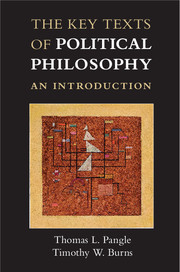Book contents
- Frontmatter
- Dedication
- Contents
- Acknowledgments
- Introduction
- Part I Classical Political Philosophy
- Part II Biblical Political Theology
- Part III Modern Political Philosophy
- 6 Machiavelli’s Discourses and Prince
- 7 Bacon’s New Atlantis
- 8 Hobbes’s Leviathan
- 9 Locke’s Second Treatise of Government
- 10 Montesquieu’s Spirit of the Laws
- Part IV Modernity in Question
- Name Index
- Subject Index
- References
10 - Montesquieu’s Spirit of the Laws
Published online by Cambridge University Press: 05 October 2014
- Frontmatter
- Dedication
- Contents
- Acknowledgments
- Introduction
- Part I Classical Political Philosophy
- Part II Biblical Political Theology
- Part III Modern Political Philosophy
- 6 Machiavelli’s Discourses and Prince
- 7 Bacon’s New Atlantis
- 8 Hobbes’s Leviathan
- 9 Locke’s Second Treatise of Government
- 10 Montesquieu’s Spirit of the Laws
- Part IV Modernity in Question
- Name Index
- Subject Index
- References
Summary
The vast masterpiece of the Baron de Montesquieu (1689–1755) became extraordinarily influential almost overnight. Its most famous contributions were: a new theory of participatory democracy (which inspired Rousseau among others); a new theory of “despotism” (l’état despotique: the term first became current through Montesquieu); a new theory of federalism; a new theory of the decisive influence of climate, geography, and history in shaping human existence; a new theory of the separation of powers (legislative, executive, and judicial); and a new, reformist theory of civil and criminal law to provide greater security for the accused and more reasonable procedures for parties in lawsuits. It was the last two that made Montesquieu the authority for the framers of the American Constitution, and for Blackstone’s reform of English law in his Commentaries on the Laws of England (1776). In addition, The Spirit of the Laws is the single most important philosophic inspiration for the eventually successful movement, initiated by English disciples of Montesquieu, to abolish racial slavery of Africans (relying especially on bks. 15–17, and above all the mordantly ironic 15.5). Last but not least, The Spirit of the Laws is the work that made authoritative the idea that the peaceful common good of all mankind can be best advanced through the worldwide spread and intensification of globalized commercialism.
The Norms of Nature
Montesquieu begins with an account of the causal matrix governing the entire universe. The first originating cause is god: not the biblical God, but the god of nature, the god discernible by human science. This true god is identified with “a primordial reason” (une raison primitive) generating the rest of the universe in accordance with unvarying “laws” that are “the necessary relations that derive from the nature of things”; “thus the creation, which would appear to be an arbitrary act, presupposes rules as invariable as the fatality of the atheists” (1.1). By implication, there are no miracles, and in particular no miracles of revelation. The miraculous, and revealed teachings play no role in Montesquieu’s account of human reality.
- Type
- Chapter
- Information
- The Key Texts of Political PhilosophyAn Introduction, pp. 307 - 328Publisher: Cambridge University PressPrint publication year: 2014

